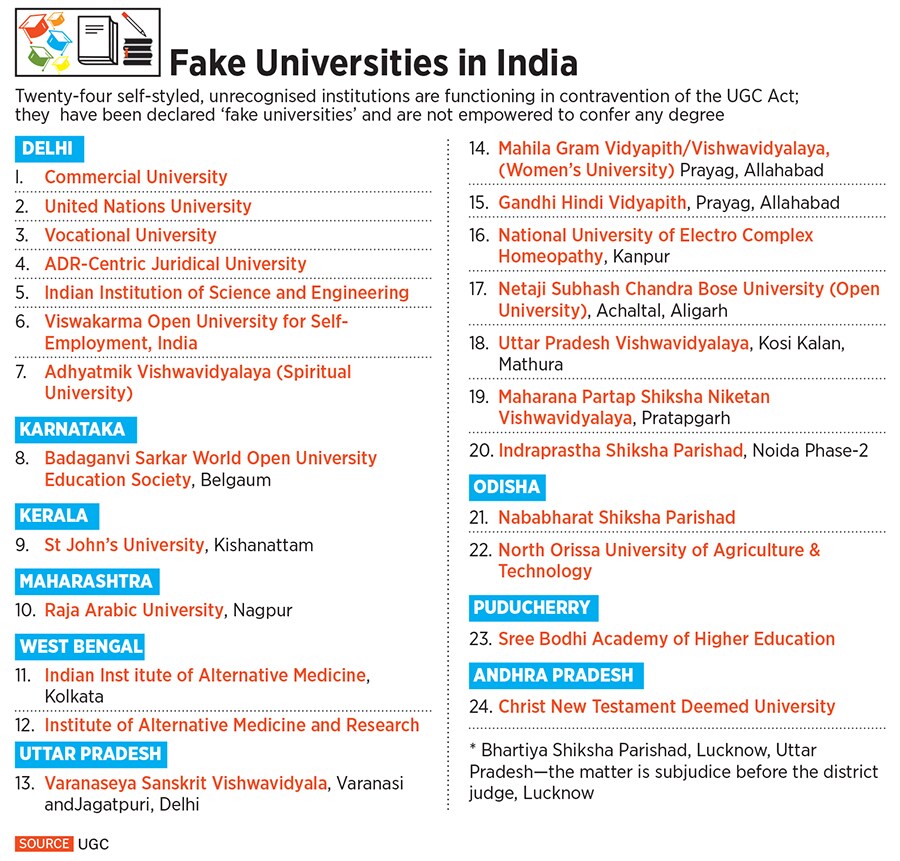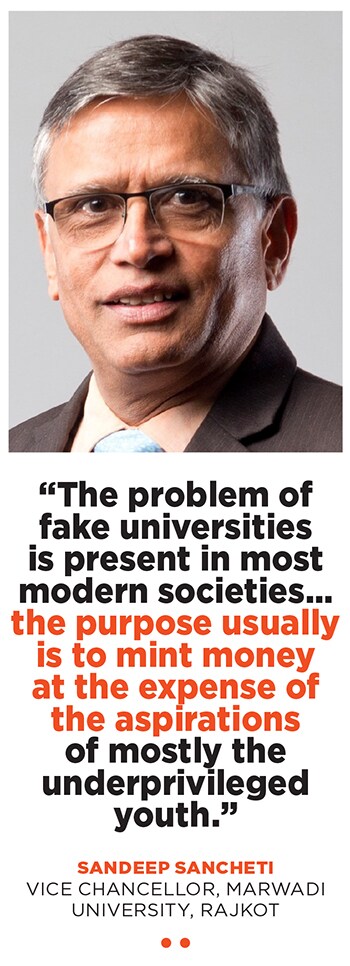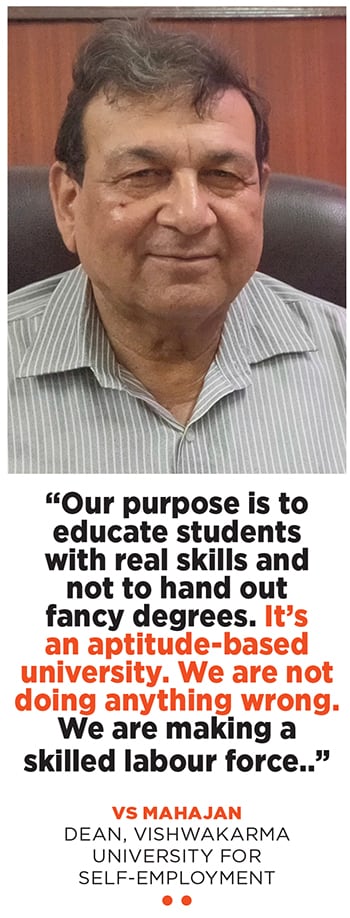Six (and more) degrees of fakery
How inaction against the rash of fake universities across the country may be incentivising the mushrooming of more such institutions


Vimal Kumar (name changed) is a practising homeopathy physician in Jaunpur, Uttar Pradesh. At least that’s what he calls himself. He received his BHMS (Bachelor of Homeopathic Medicine and Surgery) degree from the National University of Electro Complex Homeopathy (NUECH), Kanpur, in 2004. That he did get a degree can’t be disputed. However, what can be debated is the status of the university he graduated from.
As per the University Grants Commission (UGC), the NUECH is one of ‘24 self-styled, unrecognised institutions functioning in India in contravention of the UGC Act, 1956’. The UGC has put up the list (see box) on its website and has no qualms in labelling them ‘fake’. These self-proclaimed universities are not authorised to confer degrees, yet 11 of the 24 institutions, including Kumar’s alma mater, have made it to the UGC’s fake universities list every year since its inception in 1994. The UGC is a statutory body under the ministry of education that has the mandate to maintain higher education standards in the country.

“A family friend told me about the university… at that time, I didn’t know it wasn’t recognised. Today, no one cares where I got the degree from… that I have it and the licence to practice is what matters,” says Kumar, adding that there were 40 students in his batch who were taught by five professors. Kumar didn’t have to go through a selection process he submitted his documents and was admitted to the institute after a general round of questioning about his family background and education.
According to the UGC, there can be five types of degree-granting institutions in India: Central universities, which are established by an Act of Parliament and are funded by the central government institutes of national importance—such as IITs and IIMs—established/declared by an Act of Parliament state and private universities that are established by the Act of the state legislature and funded by state governments and/or are self-financing institutes and institutions deemed to be universities that are declared by a government notification, on the advice of UGC, under Section 3 of the UGC Act, 1956.
Fake universities, on the other hand, are unrecognised institutions that do not have accreditations and are not established under any Centre, state/provincial Act as per section 22(1) of the UGC. On October 7, 2020, the UGC issued an annual list with 24 such universities operating in India.
Forbes India spoke to a few students and alumni of such institutes, most of whom were unwilling to share details about the examination procedures their universities follow. Some didn’t plan to put the degree to use for employment while many others didn’t know what to do once they got the degree.
“There is a demand for diplomas and degrees, and so these universities exist. The GER (gross enrolment ratio) in India is 26.3 percent, indicating the wide gap between education providers and seekers this is where these universities come in by guaranteeing education and providing degrees. However, the purpose of fake universities usually is to mint money at the expense of the aspirations of mostly the underprivileged youth,” explains Sandeep Sancheti, vice chancellor, Marwadi University, Rajkot, and former president of The Association of Indian Universities.
Forbes India tried to speak to Rajnish Jain, secretary & CVO, UGC, who is in charge of releasing the list every year, but he couldn’t make time for an interaction.

While Uttar Pradesh has eight unrecognised institutions on the list, Delhi has seven, while Odisha and West Bengal have two each. Maharashtra, Karnataka, Kerala and Puducherry have one each. “Southern states have taken better actions to educate people about such things, which to my knowledge are not as common in other parts of the country,” says Sancheti.
A number of these institutions have deceptive names the aim, it seems, is to sound as non-discreet and genuine as possible. For example, Netaji Subhas Open University is an authentic varsity in Kolkata, West Bengal, whereas Netaji Subhas Chandra Bose University in Aligarh, Uttar Pradesh, is a fake university. United Nations University, Delhi, is evidently inspired by the United Nations University, a global think tank and postgraduate teaching organisation headquartered in Japan. Vishwakarma University, Pune, is a UGC-approved varsity while Vishwakarma University for Self-Employment, Delhi, is a fake university.
VS Mahajan, dean of Vishwakarma University for Self-Employment, who claims to graduate around 1,000 students every year, isn’t losing sleep over UGC approval. He says the institution’s vision is different. “Our purpose is to educate students with real skills and not to hand out fancy degrees. It’s an aptitude-based university. We are not doing anything wrong. We are making a skilled labour force,” explains Mahajan, who boasts of receiving a letter from the ministry to promote SWAYAM, a digital education programme initiated by the Government of India (GoI). “If they consider us fake, why do they want to do business with us?” he asks.
Mahajan claims it is the only university generating crores of jobs. He says its alumni has been recruited “for all types of jobs by GoI”, but doesn’t get into details of the jobs.
The university also awards honorary doctorates in fields ranging from neurosurgery to social work, along with degrees and diplomas. Ravindra Bhole is one of the recipients of a doctorate in social service. “I got a WhatsApp forward which had the link to a form that asked me about my contribution to social work… based on that I received the doctorate,” he says. “It’s not an educational qualification, it’s an award they offer to people who have made a significant contribution to their respective fields.”
According to Bhole, who wasn’t aware that Vishwakarma also offers degrees apart from providing doctorates, the institution has a noble cause: To certify people ignored by renowned universities. “Experience is the biggest teacher and Vishwakarma awards that. People do not always have the resources to opt for fancy degrees. There is nothing wrong with honouring skills and someone’s on-field efforts,” he says.
The Institute of Alternative Medical Sciences, Kolkata, established in 2009, offers multiple courses in “alternative medicine”. Its website mentions that candidates can even avail of a Registered Medical Practitioner Certificate. Forbes India’s efforts to speak with the dean did not yield results. However, when we approached the institute as a student, the management detailed the admission process and the fee structure for various courses offered.

News reports suggest that the question of why the UGC has not taken any action against such universities was asked to education minister Ramesh Pokhriyal in the Lok Sabha in December 2019. He said the UGC had sent letters to state governments to take appropriate action against fake universities in their jurisdictions.
"The problem of fake universities is present in most modern societies and countries. We have seen in the past how a fake university in the US lured Indian students the problem is common across countries, although the extent may vary,” says Sancheti.
“To stop such universities from deceiving our youth, we need individual efforts as much as UGC"s active intervention. The UGC not only releases this list every year, but also promotes it via various news portals and has taken legal action against some of these universities. We need to be more conscious and aware while choosing a university,” says Sancheti. “If the judiciary could also act faster on the open cases against such universities, it would help in eliminating them earlier and protect the students.”
As Sancheti puts it, if action against such universities is delayed, it will only be an incentive for more such institutions to mushroom across the country.
First Published: Apr 01, 2021, 12:13
Subscribe Now